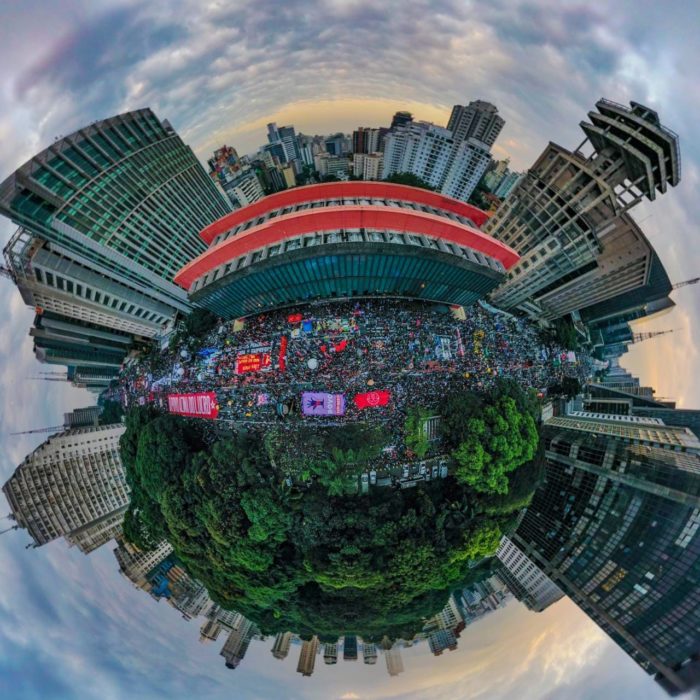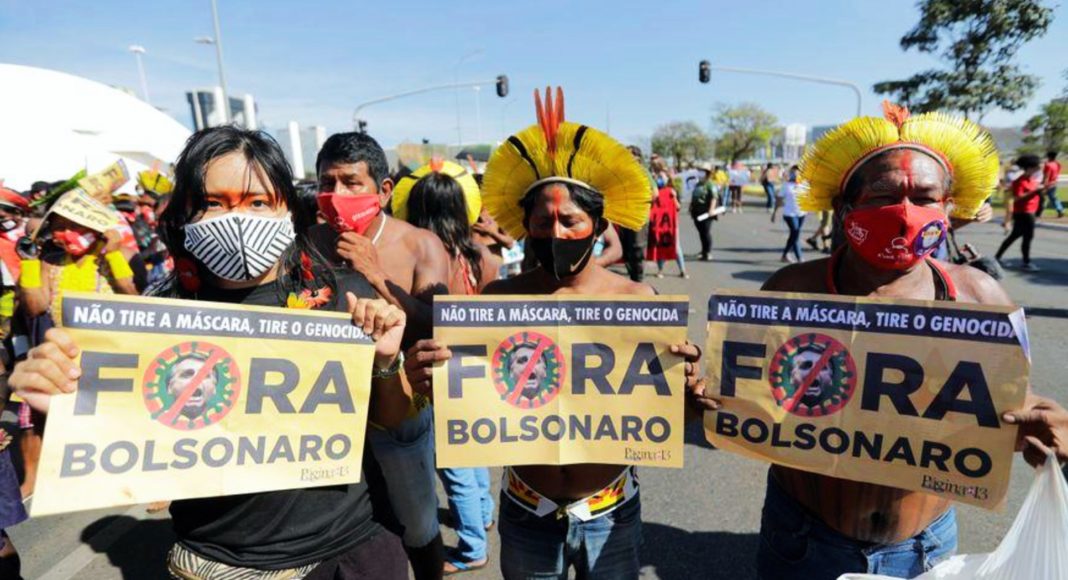Ominous clouds threaten the future of Brazil’s precarious democracy. To begin with the most shocking, shaming and dishonorable statistic: on 18 June, Brazil reached half million deaths by Covid-19.
This is not just a number, it is a complete scandal for a country that used to have, for decades, one of the best and most organized immunization programs in the world, the PNI. The PNI offered, since its creation in 1973, free vaccines for preventing a number of diseases, supplied to the entire population, no matter how remote and isolated their place of residence. This program has been part of the National Health System (SUS), and was responsible for the control or eradication of diseases like polio, measles, smallpox, tetanus, pertussis, hepatitis-B, diphtheria, tuberculosis, yellow fever, meningitis and, more recently, immunisation for teenagers against human papillomavirus (HPV).
When Covid-19 struck in 2020, the PNI was in place and ready to distribute a vaccine, as soon as it was available on the market. However, the Minister of Health, under president Bolsonaro’s directive, acted on the assumption that the disease was like ‘a little flu’ (the president’s own words), and that in a few weeks the entire population of 220 million would come into contact with the virus and naturally acquire so called ‘herd immunity’ (a terrible choice of words!).
Bolsonaro’s directive was motivated by his belief that the national economy should not be brought to a halt by any measures like lockdowns and social distancing, and that vaccines would cost too much money. Instead, and oriented by unscrupulous people, including his inner circle (his three politician sons, some of his ministers and aides, and even medical doctors), to bet on the so-called ‘anti-Covid cocktail’, which included drugs that had already been tested , and showed no positive efficacy against Covid.
Vaccine offers spurned
Only after one of his potential political opponents for next year’s presidential elections, the Governor of São Paulo state, João Dória, started a move to produce the Chinese Sinovac vaccine (Coronavac) in a São Paulo research Institute, Butantan, did the president react. However, his first response was to say that he would not allow the ‘useless Chinese vaccine’ to be administered nationwide under the PNI. By then, Dória was using Coronavac as a major flagship for his own political promotion, forcing Bolsonaro to respond, by allowing a federal-based research facility, and traditional vaccine producer, Fiocruz, to start producing the AstraZeneca vaccine. He also reluctantly allowed Coronavac to be administered nationwide under PNI.
Nevertheless, the combined capacity of the two institutes would not be sufficient to produce the number of shots necessary to halt the spread of Covid-19 –an estimated 320 millions doses being required to immunize 70 per cent of the country’s population. At least half of these doses had to be purchased abroad.
In the meantime, other vaccines being produced by Pfizer, Janssen, and other pharmaceutical companies, went completely ignored by the Bolsonaro government. Pfizer was a particularly scandalous case: between March 2020 and January 2021, the presidential office and the Minister of Health completely ignored 81 email messages sent by the pharmaceutical company to the Brazilian government, offering to negotiate a large shipment of their vaccine. Only in March 2021, when the death toll had reached 280,000, was there a response. The president’s excuse for delaying the Pfizer contract for almost one year was that they were asking ‘too much money’.
The CPI unearths some truths
Recently the opposition in the Senate managed to pass a bill to establish a CPI (a parliamentary commission of enquiry) , with a mandate to investigate government misconduct during the pandemic. The CPI started work a few weeks ago and is attracting the nation’s attention, being followed on TV and social media as closely as the final episodes of one of the nation’s favorite soap operas. Depositions by former and current government officials, as well as scientists, the CEO of Pfizer, and many others, are unveiling mass of evidence that clearly identify the government and Bolsonaro himself, as responsible for many of the hundreds of thousands of deaths by Covid-19. This case has sparked outrage likely to trigger not only national, but also international consequences.
Scientists have calculated, based on the average number of deaths from Covid worldwide compared with the figures for Brazil, that the lives of nearly 400,000 Brazilians could have been spared, had the government acted in due time. Instead, the government instructed the Brazilian Ambassador in Washington to negotiate and purchase huge amounts of hydroxychloroquine from the US government (while Donald Trump was still president) to be distributed in Brazil by SUS.
In one of the most affected state capitals, Manaus, in the state of Amazonas, the then health minister, General Pazuello, sent one of his top officers from the ministry to promote the use of chloroquine, while people were suffocating and dying in the local ICUs due to the lack of oxygen. The senator who chairs the CPI, himself a former governor of Amazonas, said that Manaus and its citizens were the subject of a macabre experiment by the federal government that had caused thousands of deaths.
Protests break out
Widespread outrage has started to spark nationwide public reaction. On 29 May, there were protests in many large cities, with the traditional press still trying to downplay the outcry, not publishing its extent and importance. However, on 19 June, the protests were much larger, and took place in more than 400 cities, in all 26 states of Brazil. This could not be ignored by the press; it also made the headlines worldwide, as there were similar protests in many capitals in Europe, North America and Asia.

Bolsonaro discovers fear
The 2022 political scenario is starting to take shape, and Bolsonaro is not liking what he sees. First, his major historical opponent, former president Luis Inácio Lula da Silva (Lula), not only recovered his political rights 1)Lula was the front-runner candidate for the 2018 presidential elections, until he as condemned by a kangaroo court presided by infamous judge Sergio Moro. Lula spent 580 days in prison and was released after the allegations against him collapsed, and Moro was officially declared to having been ‘partial’ in Lula’s trial. It was also found that Moro was in cahoots with the prosecutors and, seemingly, also with Bolsonaro. After Bolsonaro took office in January of 2019, he nominated Moro as Justice Minister. Sixteen months later, fearing that Moro, still a popular figure, was planning to run for the 2022 presidential elections, and was likely to take votes from him, Bolsonaro fired him., but started a national dialogue with the leadership of many of the key political parties and groups across the political spectrum.
And, in a move that seemed highly unlikely just a few weeks ago, former president Fernando Henrique Cardoso, from the formerly powerful centre-right party PSDB, gave an interview to Globo TV network, the largest in Brazil, saying that, in the event of an election between Bolsonaro and Lula, he would vote for democracy, voting for Lula. This was a surprising move, as PSDB contested the victories by Lula and his party, PT, in previous presidential elections.
The combination of these recent developments is producing a feeling seemingly new to Bolsonaro, a man accustomed to impose his wishes and policies like the dictator that, in his inner soul, he wants to be. This new feeling is fear.
The already deranged mind of the president is showing clear signs of unbalance, as he steps up threats to the Supreme Court, the Senate and his opponents, and calls the armed forces ‘my armies’, confusing his person with the State he supposedly represents.
Furthermore, he is also counting on the support from the PM, the state military police forces that, in the Brazilian system, are supposed to be under the control and command of the 26 governors. However, in today’s Brazil, none of the state governors can truly claim to be in control of their police, in whose ranks there are countless admirers and followers of Bolsonaro.
Elections may spark disaster
Next year’s presidential and parliamentary elections bring a threat of disaster. Many among the analysts of the political scene, like the social sciencist and fellow professor at the University of Campinas, Marcos Nobre, are forecasting two possible scenarios. The first one is Bolsonaro’s victory over Lula, followed by a democratic disruption and the onset of an authoritarian regime, like those of Hungary, the Philippines and Poland. The second is that Lula defeats Bolsonaro, and the latter stages a coup d’état, with the support of the military and the PM.
Whatever the future holds for Brazil, its fragile democracy seems to be under greater threat than at any time since it was restored in 1985, after 21 years of military dictatorship.
And, as Brazil reached the shameful milestone of half million of its citizens slain by Covid-19, the president uttered not a single word of condolence or comfort to the families and friends of the victims.
Main image: Indigenous people join the protests on June 29, in the country’s capital, Brasília
Alvaro Penteado Crósta is Professor at the University of Campinas (UNICAMP) and Researcher at the Brazilian National Council for Research (CNPq). He was Deputy Vice-Chancellor of UNICAMP (2013-2017), and Director of the Geosciences Institute (2005- 2009). He is a full Member of the Brazilian Academy of Sciences.
References
| ↑1 | Lula was the front-runner candidate for the 2018 presidential elections, until he as condemned by a kangaroo court presided by infamous judge Sergio Moro. Lula spent 580 days in prison and was released after the allegations against him collapsed, and Moro was officially declared to having been ‘partial’ in Lula’s trial. It was also found that Moro was in cahoots with the prosecutors and, seemingly, also with Bolsonaro. After Bolsonaro took office in January of 2019, he nominated Moro as Justice Minister. Sixteen months later, fearing that Moro, still a popular figure, was planning to run for the 2022 presidential elections, and was likely to take votes from him, Bolsonaro fired him. |
|---|

